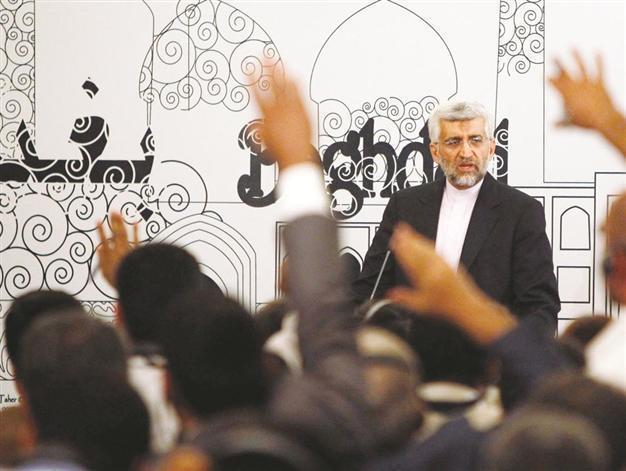Next Iran stop Moscow
BAGHDAD

Iran’s chief nuclear negotiator Jalili offers a lukewarm assessment of recent talks. REUTERS photo
Iran and six world powers are set to move their negotiations over the Islamic republic’s nuclear program to Moscow after the two sides failed to make much progress during talks this week in Baghdad.“What we have now is some common ground and a meeting in place where we can take that further forward,” EU foreign policy chief Catherine Ashton said, announcing another round in Moscow on June 18-19. In the meantime, the parties will “maintain intensive contacts.”
The next diplomatic effort by Iran and the P5+1 – the United States, Russia, China, Britain, France and Germany – at one stage even looked unlikely to happen, until 11th-hour efforts managed to salvage the process, for now.
“We remain determined to resolve this problem in the near term through negotiations, and will continue to make every effort to that end,” she said after two “very intense” days of talks.
Ashton added, however, that there remained “significant differences” and that Iran must take “concrete and practical steps to urgently meet the concerns of the international community.”
Saeed Jalili, Iran’s top nuclear negotiator, offered a lukewarm assessment of what the negotiations achieved, in light of the European and U.S. refusal to lift tough sanctions as Tehran had hoped. “The result of the talks was that we were able to get more familiar with each other’s views,” Jalili said at a press conference after Ashton left.
The Baghdad discussions began with hopes for progress before each side accused the other of failing to offer meaningful, realistic proposals. The crux of the dispute appeared to be Iran’s demand for fast relief from economic sanctions as part of any deal for it to stop higher-grade uranium enrichment, a pathway to nuclear arms, whereas Western powers insisted Tehran must first shut its enrichment efforts down.
US envoy in Israel
In Washington, Secretary of State Hillary Clinton said significant differences remain between the two sides and that it was now up to Iran “to close the gaps.” “Iran now has a choice to make: Will it meet its international obligations and give the world confidence about its intentions, or not?” Clinton said.
Meanwhile, the head of the U.S. delegation to the nuclear talks with Iran arrived in Israel on May 25 to brief officials after a meeting in Baghdad. Wendy Sherman’s visit is the latest in a series of meetings between U.S. and Israeli officials over Iran’s nuclear program, which Tehran insists is peaceful but much of the international community suspects is a cover for attempts to obtain nuclear weapons. U.S. officials were coy about the purpose of her visit, but it was clear that the aim was to brief officials in Israel, whose government is highly skeptical as to whether diplomacy can prevent Iran from obtaining the bomb, about the Baghdad talks.
The U.S. State Department said in a statement that the visit was for “consultations on bilateral and regional issues with senior officials and to reaffirm our unshakeable commitment to Israel’s security.”
“She has arrived,” said U.S. embassy spokesman Kurt Hoyer. “I’m not 100 percent sure what her schedule is,” he added, when asked whom Sherman would meet while in the country. Israeli public radio, however, said Sherman was to meet with Prime Minister Benjamin Netanyahu to report on the Baghdad talks.
Compiled from AFP, AP and Reuters stories by the Daily News staff
















